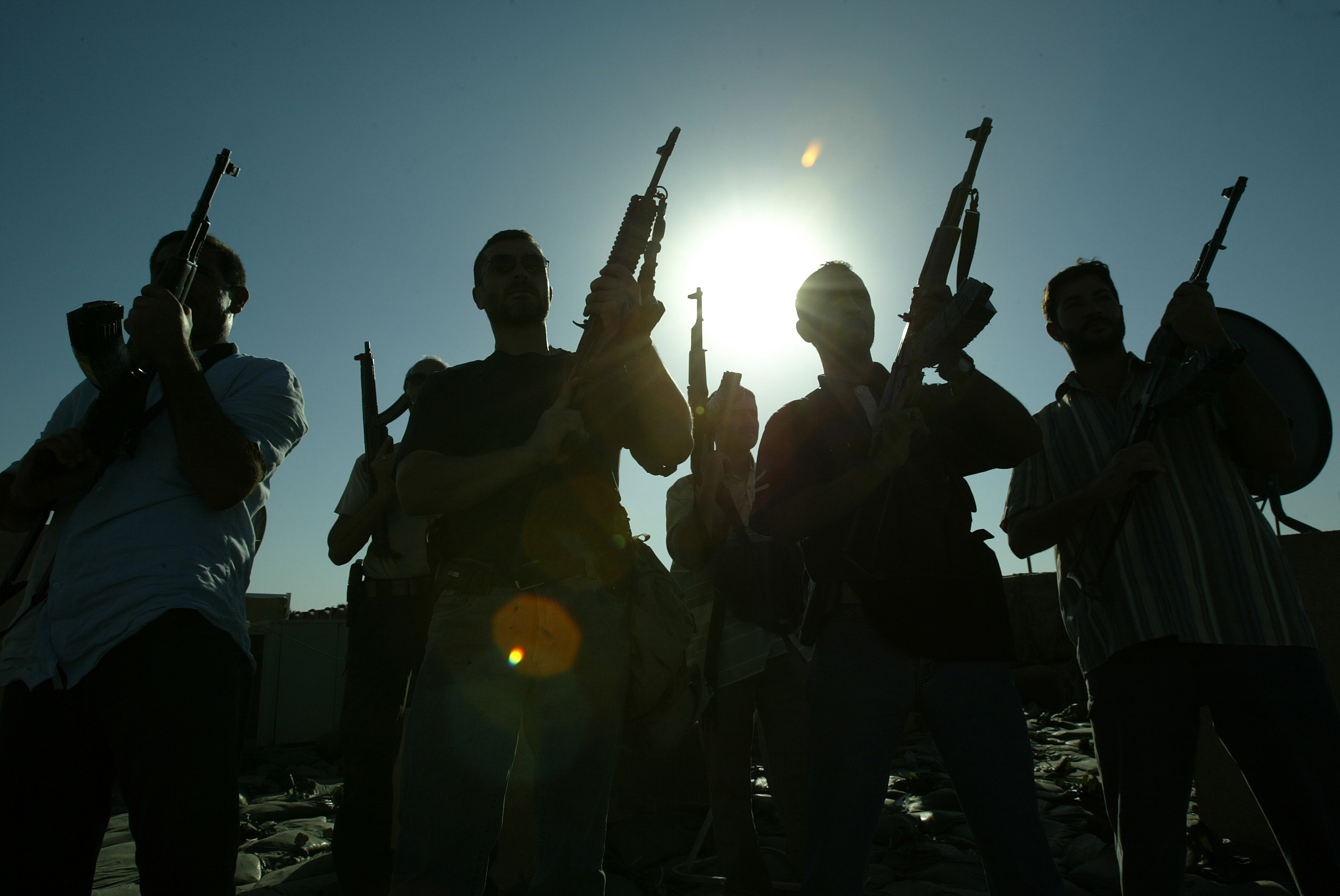Mercenary firms: a lucrative niche market

European states are subcontracting an increasing number of tasks to private military companies to cut their armies’ sizes and budgets. These mainly US firms cost them dearly, however, says military expert Alexandre Vautravers.
Since the 1990s, the United States Armed Forces and particularly also the armies of Europe have been using private military firms to handle tasks they can no longer fulfil.
Alexandre Vautravers, head of the department of international relations at Webster University in Geneva and chief editor of Revue Militaire Suisse, explains why.
swissinfo.ch: How do you explain the rising number of private military firms?
Alexandre Vautravers: Private military companies primarily work in niche markets, in activities which conventional armed forces cannot or do not want to carry out. Armies with annual budgets are not necessarily profitable according to defence representatives. They prefer to entrust a whole number of maintenance and logistics tasks to those companies. During the war in Iraq, for example, the US army signed extremely lucrative contracts for laundry, hygiene and cleaning.
These companies also win a lot of contracts to protect people and buildings, an area where the employment of trained and heavily equipped professional military staff is not always justified.
Finally, they fill the gaps by providing qualified personnel. This is, for example, the case for helicopter pilots. The armed forces train a lot of pilots, but the pilots often do not stay for a long time because the salaries are much more lucrative in private industry. The forces are therefore often obliged to ask private companies to accomplish certain missions with trained pilots.

swissinfo.ch: Is it cheaper to subcontract to private military companies?
AV: No, their tarifs are very high. As you can see in the book The Three Trillion Dollar War (2008), by Joseph Stieglitz, their services costs two to four times those provided by the army. For certain very specific activities in Iraq, this ratio could rise from one to ten.
But you have to be aware that contracts with private companies may be very limited in time. Which can be an issue with professional armed forces like in the US, France or Germany, where contracts generally last between three and five years. In addition, there is political pressure in all those countries to cut the head count and above all the costs. In professional armies in Europe, between 60 per cent and 70 per cent of the defence budget is spent on salaries.
swissinfo.ch: Are we witnessing a kind of privatisation of war?
AV: In some ways you could say that. But privatisation is not necessarily what the armed forces want – it’s more a result of shrinking defence budgets in Europe. One example is the British defence budget, which has seen some very important cuts since 2010. So in-flight refuelling, for instance, is partly operated by a private military company. The same can be observed in the electronic war: the British army is trained by private companies, which allows it to gain a foothold in the cyber war.
Even sea rescue, which was conducted by Royal Air Force helicopters up until now, will be abandoned because of its costs and taken over by four civil companies.
In January 2013, the cabinet asked parliament to discuss whether to outlaw Swiss-based private security firms which directly participate in armed conflicts abroad.
At the end of 2005, the Swiss government adopted a report on military and private military companies. It commissioned the Federal Department of Foreign Affairs to launch an international process to promote the respect of international humanitarian law and human rights among private military and security firms operating in war zones.
The publication, known as the Montreux Document, is the first result achieved jointly by the foreign office and the International Committee of the Red Cross (ICRC).
On November 9, 2010, 58 private security companies gathered to sign the international code of conduct, which obliges them to respect human rights and international humanitarian law.
By January 2013, 592 private military companies had signed this code of conduct. The private military market is valued at more than $100 billion per year.
Sources: Federal Department of Foreign Affairs and swissinfo.ch
swissinfo.ch: What is happening in the US, the largest market for military firms?
AV: The US market is very different. The defence budget doubled between 1997 and 2007, reaching its peak before the first election of Barack Obama, when it accounted for 52 per cent of the worldwide defence budget. The Bush administration made massive use of private companies in Afghanistan and Iraq to fill the gap between its fixed targets and the reality on the ground.
The Obama administration repeatedly tried to change the direction of this trend, for example by participating in the Montreux initiative and its code of conduct for private military companies. From 2010, there was some very strong pressure from the administration to reduce the number of private military companies, particularly in Afghanistan. This, incidentally, bothered the Afghan government, which also resorted to these companies, for example for the protection of President Karzaï, at a time when the country was about to reconstruct an Afghan army and police force.
Having said that, a number of activities continue to be sub-contracted: infrastructure, logistics, cyber war, intelligence and the operating of drones. The US remain the major supplier of private military companies. Many former US soldiers start their own firm or join another company.
Many companies established in Africa or in the Gulf States are more or less disguised US firms which are not interested in being US based.
swissinfo.ch: Do emerging countries also increasingly use private firms?
AV: In those countries the trend is different, pure and simple because emerging countries attach a lot of importance to the principle of the state’s sovereignty, particularly to its monopoly in the use of legitimate force. This is contrary to the international community, or in other words the western states.
With this more classical concept of defence and armed forces, the states follow a logic where they have to strengthen their national armies and not where they sub-contract activities to private military enterprises.
Private military firms are therefore paradoxically active at the two extremes of the defence spectrum: in rich post-industrial states – where defence use is on the decline – and in poor developing countries, which depend on outside help.
(Translated from French by Chantal Britt)

In compliance with the JTI standards
More: SWI swissinfo.ch certified by the Journalism Trust Initiative










You can find an overview of ongoing debates with our journalists here . Please join us!
If you want to start a conversation about a topic raised in this article or want to report factual errors, email us at english@swissinfo.ch.